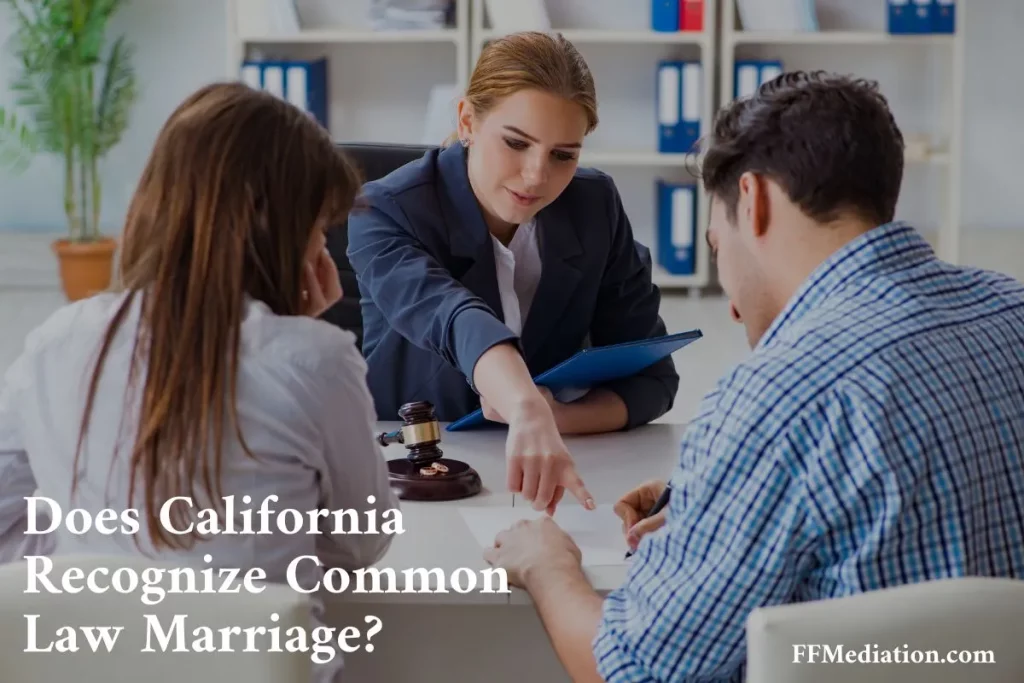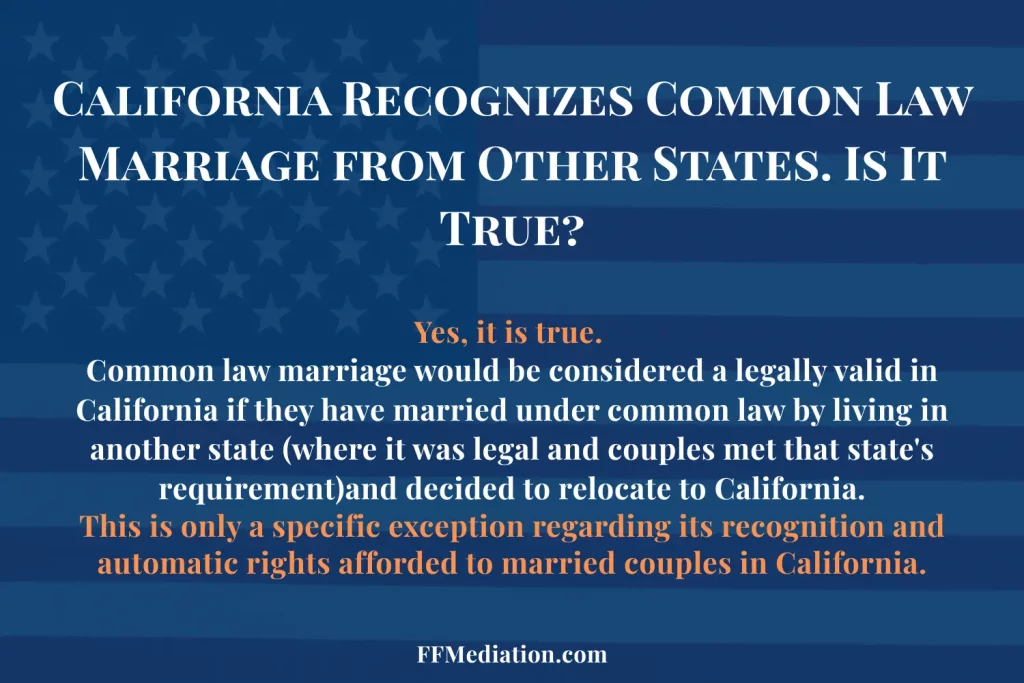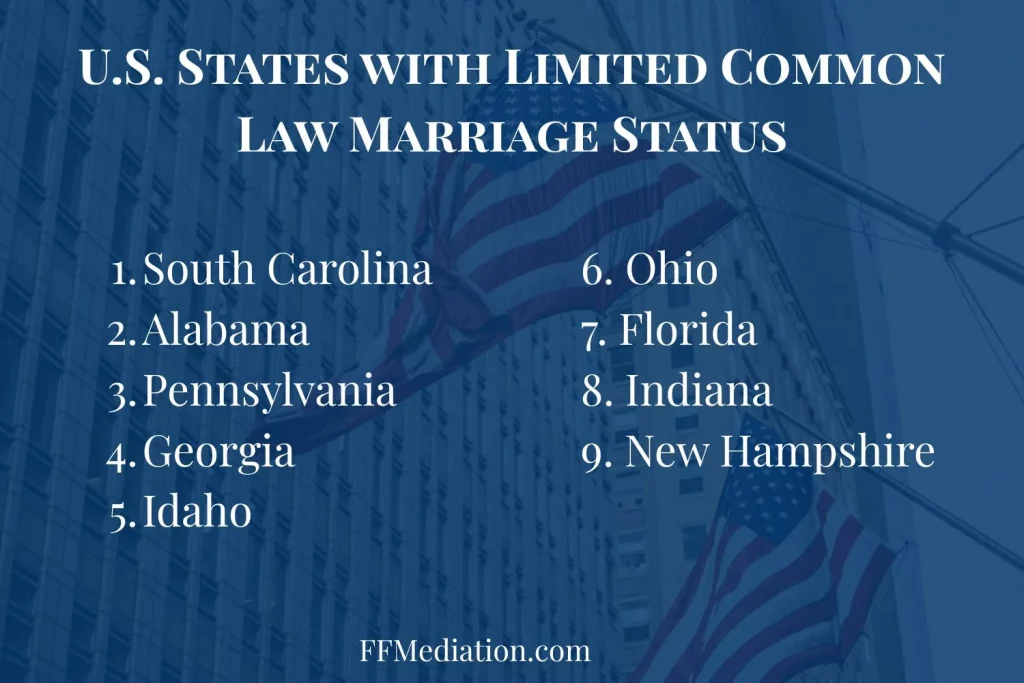
Providing Divorce Mediation Services Throughout California
Providing Divorce Mediation Services Throughout California
Home » Divorce and Family law Blog » Common Law Marriage in California: Complete Guide(2025)

A common law marriage is a legally recognized marriage between two romantic partners who consider themselves married without obtaining a marriage license or going through a ceremony.
Many states in the U.S. no longer recognize common-law marriage. And California is one of those. While many other states like Iowa and Colorado still recognize this union, which means if you contract such marriage in common law states and relocate to California, it could recognize this union. This is the only exception to its recognition.
The other legal alternatives of common law marriage in California are cohabitation agreements and domestic partnerships.
If you are facing problems or confusion with common-law marriage in California, Dina Haddad, California-based divorce attorney-mediator, can help you. Her office offers a FREE Consult for Common Law Marriage related matters. Book today.
This article describes California common law marriage in detail, from its history to the rights of unmarried couples living together.
Legal Information Institute defines common law marriage in these words:
“A marriage without formalities of license, marriage certificate, or ceremony is known as common-law marriage.”

No, California does not recognize common law marriage contracted in the state (no matter if you meet its requirements).
California does not have family law to recognize a union based on verbal consent and a specific length of cohabitation.
Hence, if you contract common-law marriage instead of exploring other alternatives that fit well for unmarried couples in California, it would be like denying your rights that unmarried couples may seek through a domestic partnership or cohabitation agreement.
But California recognizes common law marriage law marriage in one situation. Let’s see how.

Yes, it is true.
Common law marriage would be considered a legally valid in California if they have married under common law by living in another state (where it was legal and couples met that state’s requirement)and decided to relocate to California.
This is only a specific exception regarding its recognition and automatic rights afforded to married couples in California.
Common-law marriage is not just cohabitation. Though cohabitating is one of the elements that constitute common law marriage. This is how it is distinct from cohabitation.
In common law marriage, both couples intend to be married and live together as married couples, unlike cohabitation, in which couples live together as unmarried couples.
You are likely to see the following things in common-law marriage couples:
Once there was a time in California when it used to honor common law marriages. Yes, California did recognize common law marriage more than 100 years before back in 1895.
As the state has modernized with time, various aspects of life—including marriages—are regulated and formalized by enacting laws.

California does not recognize common-law marriage as legal marriage, though you meet its technical requirements while residing in the state. It simply means that you will have no rights and privileges that married couples get by default.
The following is the list of 9 states that fully recognize common-law marriage and are called common-law marriage states:
Now we are going to discuss the states that used to recognize common law marriage once, but now they have limited recognition of such marriages.
The following is the list of 9 states with their date of recognition or abolition.
If you want to protect your rights and interests while still being legally unmarried in California (not by common law marriage), these might be the two best alternatives to consider in California:
Find Law defines domestic Partnership in these words:
“Domestic Partnership is a legally recognized form of relationship between two adults who have chosen to share one another’s lives in an intimate and committed relationship of mutual caring.”
In 1999, domestic partnership was limited to same-sex couples in California. But, in 2020, it has evolved to extend rights and protection for opposite-sex couples.
Hence, couples or partners who want to stay as unmarried partners can use this arrangement besides securing their rights and benefits, here in California.
To establish it, fill out a domestic partnership form and submit a filing fee to the California Secretary of State’s office.
A cohabitation agreement is a contract that outlines certain rights and responsibilities between unmarried partners living or cohabitating together.
It can give both partners peace of mind by setting expectations regarding (financial, property, etc.) rights and responsibilities during and after cohabitation, thus, eliminating potential conflict.
Functioning like prenuptial agreements, it can set clear guidelines regarding property division, assets and handling debts in case of separation.
Related: Avoid a Legal Nightmare with a Cohabitation Agreement
The legal rights of unmarried couples are different from those of married ones.
Before you choose a domestic partnership or cohabitation agreement, go through the following rights to make a well-informed decision.
California is a community property state, meaning that property and assets you acquire during your marriage will have joint ownership.
However, in the case of unmarried partners, the property or assets acquired during the marriage (marital property) will not be divided.
Their property rights and benefits differ from those of legally married couples. Rather, you and your partner have to establish your property rights, such as joint ownership of a home or assets.
If an unmarried couple has joint property, it shall be divided equally in the event of separation or demise of one of them. However, if one partner is listed as the owner of the property but both partners have contributed their payments, the unlisted partner may have to seek legal guidance.
If unmarried partners have (a) child(ren) together, both parents will have equal rights and responsibilities for the child(ren).
However, for all the said things, unmarried couples have to establish legal paternity. By establishing paternity, a child can easily inherit assets and property in certain situations.
The unmarried partners can establish paternity or legal guardianship of their child(ren) by signing a voluntary declaration of parentage or through medical tests.
Financial matters are complex for unmarried partners because, in California, they are considered two separate individuals regarding their finances.
If one of the partners dies, the other may be denied access to the finances of that partner, such as:
The solution? You and your spouse must aim to own joint finances and financial accounts (savings, investments, etc.).
Since California does not recognize common law marriage (and ended in 1895), it would not matter how long you have been together. You can look for other alternatives to preserve your rights as an unmarried couple in California.
California stopped recognizing common law marriage 100 years back in 1895.
The “7-year rule” is a common misconception pertinent to California common law marriage. Since the state of California does not recognize common law marriage, spending 7 or more than seven years would make the marriage legally valid in the state.


Families First Mediation is a pioneer in the field of divorce mediation. Our entire divorce mediation team takes great pride in being active trainers, divorce mediators and teachers of mediation in the greater California area. If you are considering a collaborative divorce, legal seperation or looking for a san jose divorce lawyer we have services that may be beneficial to you. Take advantage of our vast expertise and background in the field of divorce mediation and our genuine desire to help with your divorce mediation services.